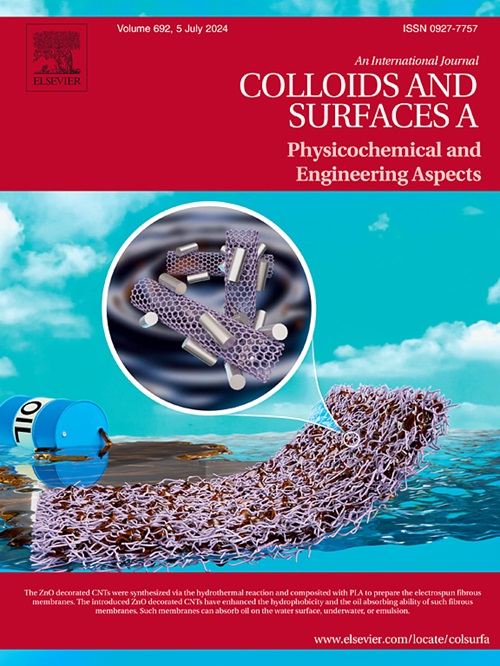Structure, properties and reaction mechanism of formaldehyde-free melamine-urea-glyoxal co-polycondensation resin
IF 4.9
2区 化学
Q2 CHEMISTRY, PHYSICAL
Colloids and Surfaces A: Physicochemical and Engineering Aspects
Pub Date : 2024-11-26
DOI:10.1016/j.colsurfa.2024.135833
引用次数: 0
Abstract
To reduce the harmful effects of free formaldehyde released from wood-based panel on human health and the environment, in this study, melamine-urea-glyoxal (MUG) resin was synthesized by using low-toxicity and biodegradable glyoxal instead of formaldehyde. It provides a comprehensive discussion on the structures, reaction mechanisms and properties of MUG resins with different molar ratios were compared and analyzed. FT-IR, 13C NMR, and XPS confirmed the co-polycondensation reaction between M, U, and G. However, with the change of raw material ratios, the structures of the MUG resins were less affected, the properties of the MUG resins were obviously different. When the molar ratio is R = n(M): n(U): n(G) = 0.16:0.30:1.0, thermal analysis showed that MUG plywood had better thermal stability. Evaluation of the gluing properties revealed that the dry and wet strengths of MUG adhesive bonded plywood reached 1.21 MPa and 0.91 MPa, respectively. In contrast to reported glyoxal-related wood adhesives, the MUG adhesive displayed much higher bonding strength, vastly superior water resistance. This study provides a new green pathway for the development of new urea formaldehyde adhesives, which helps to enhance their potential application value in the wood industry.
无甲醛三聚氰胺-尿素-乙二醛共缩聚树脂的结构、性能和反应机理
为了减少人造板释放的游离甲醛对人类健康和环境的危害,本研究采用低毒性、可生物降解的乙二醛代替甲醛,合成了三聚氰胺-脲-乙二醛(MUG)树脂。研究对不同摩尔比的 MUG 树脂的结构、反应机理和性能进行了比较和分析。傅立叶变换红外光谱(FT-IR)、13C 核磁共振(13C NMR)和 XPS 证实了 M、U 和 G 之间的共缩聚反应。当摩尔比为 R = n(M): n(U): n(G) = 0.16:0.30:1.0 时,热分析表明 MUG 胶合板具有更好的热稳定性。胶合性能评估显示,MUG 粘合胶合板的干强度和湿强度分别达到 1.21 兆帕和 0.91 兆帕。与已报道的乙二醛相关木材粘合剂相比,MUG 粘合剂显示出更高的粘合强度和更优越的耐水性。这项研究为开发新型脲醛胶粘剂提供了一条新的绿色途径,有助于提高其在木材工业中的潜在应用价值。
本文章由计算机程序翻译,如有差异,请以英文原文为准。
求助全文
约1分钟内获得全文
求助全文
来源期刊
CiteScore
8.70
自引率
9.60%
发文量
2421
审稿时长
56 days
期刊介绍:
Colloids and Surfaces A: Physicochemical and Engineering Aspects is an international journal devoted to the science underlying applications of colloids and interfacial phenomena.
The journal aims at publishing high quality research papers featuring new materials or new insights into the role of colloid and interface science in (for example) food, energy, minerals processing, pharmaceuticals or the environment.

 求助内容:
求助内容: 应助结果提醒方式:
应助结果提醒方式:


